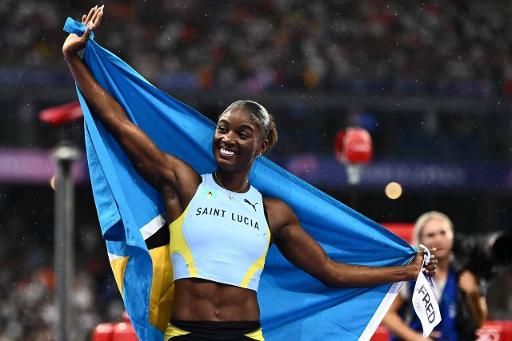By Pascal Archimède
The recent visit of Teddy Riner to Guadeloupe to celebrate his Olympic successes, as well as the exceptional performances of Francophone and Anglophone Caribbean athletes at the Paris Olympic Games, raises a fundamental question: Why are Afro-descendants from the Caribbean so successful in sports? Is there a genetic explanation for this undeniable superiority?
According to the book “Taboo: Why Black Athletes Dominate Sports and Why We’re Afraid to Talk About It” by Jon Entine, a genetic explanation could be proposed to explain this athletic superiority. Indeed, the ancestors of Afro-descendants in the Caribbean, as slaves, had to fight for their survival in extremely harsh conditions. Only the strongest, most resilient individuals were able to survive and pass on their genes to their descendants.

This theory of natural selection suggests that Afro-Caribbeans may have inherited the genes of these surviving ancestors, giving them a predisposition to physical and athletic performance. Characteristics such as strength, endurance, speed, and agility may have been favored by this natural selection, partially explaining the exceptional performances of Afro-descendant athletes in various disciplines.
Today’s Guadeloupeans might thus benefit from increased endurance and resilience, inherited from their enslaved ancestors. This hypothesis could partly explain why athletes like Teddy Riner, with exceptional determination and strength, emerge from this Caribbean island to conquer the heights of global sports.
It is important to note, however, that this genetic explanation in no way diminishes the role of hard work, intensive training, and determination in athletic success.

Afro-descendant athletes from the Caribbean are, above all, passionate individuals who put everything into excelling in their discipline. However, it is undeniable that the genetic heritage of enslaved ancestors may have played a role in their physical and athletic predisposition.
Moreover, the socio-cultural environment of the Caribbean also plays a crucial role in the development of these sporting talents. Sports culture is deeply rooted in Caribbean societies, with significant emphasis placed on athletic performance.
Additionally, the successes of Caribbean athletes serve as inspiring role models for new generations, creating a virtuous circle of motivation and excellence.
Ultimately, the question of the sporting superiority of Afro-descendants from the Caribbean in relation to their enslaved ancestors is complex and multifactorial. The genes inherited from enslaved survivors could be one explanatory element of their exceptional performances, alongside environmental, social, and individual factors. Recognizing this genetic dimension can contribute to a better understanding of the sporting success of Afro-Caribbeans and to the appreciation of their historical heritage.

However, it is essential to continue to encourage and support the individual and collective efforts of these athletes, recognizing the importance of hard work and passion in their pursuit of excellence.
